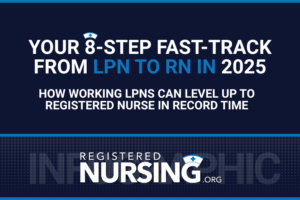Certified Nursing Assistants (CNAs) are healthcare professionals who provide intimate, hands-on healthcare to patients in medical settings under the supervision of a Registered Nurse (RN), or Licensed Practical Nurse (LPN). CNAs assist patients with bathing, dressing and any other basic activities involved in daily life.
Becoming a CNA
Dissimilar to other professionals in the nursing field, certified nursing assistants (CNAs) are not required to hold a college degree. However, training is needed, resulting in a postsecondary non-degree certificate or diploma. A state issues CNA credentials, so prospective nursing assistants must enroll in a state-sanctioned training program and pass a state certification exam.
What Are the Education Requirements for a CNA?
When becoming a CNA, individuals must have obtained a high school diploma or GED, plus nursing assistant training. You can find these programs at community colleges, trade schools, and medical facilities. Before enrolling, prospective CNAs should be sure the program they're looking into is approved by their state’s nursing board and the National League for Nursing Accredited Commission (NLNAC).
Upon completing CNA training, individuals will subsequently be required to pass a CNA certification examination. This exam consists of two parts – written and practical parts. The written exam will be in a group setting and typically consists of several multiple-choice-style questions. Test takers have 90 minutes to answer. The second portion, the clinical skills exam, is administered one at a time with a single test proctor/observer. Individuals will be tested on four selected clinical skills to demonstrate competency. They will have 30 minutes to complete this section of the exam.
Becoming a CNA In Your State
Each state may have different requirements for becoming a CNA. Click to find out about each state's specific requirements.

- AL Alabama
- AK Alaska
- AZ Arizona
- AR Arkansas
- CA California
- CO Colorado
- CT Connecticut
- DE Delaware
- DC Washington, DC
- FL Florida
- GA Georgia
- HI Hawaii
- ID Idaho
- IL Illinois
- IN Indiana
- IA Iowa
- KS Kansas
- KY Kentucky
- LA Louisiana
- ME Maine
- MD Maryland
- MA Massachusetts
- MI Michigan
- MN Minnesota
- MS Mississippi
- MO Missouri
- MT Montana
- NE Nebraska
- NV Nevada
- NH New Hampshire
- NJ New Jersey
- NM New Mexico
- NY New York
- NC North Carolina
- ND North Dakota
- OH Ohio
- OK Oklahoma
- OR Oregon
- PA Pennsylvania
- RI Rhode Island
- SC South Carolina
- SD South Dakota
- TN Tennessee
- TX Texas
- UT Utah
- VT Vermont
- VA Virginia
- WA Washington
- WV West Virginia
- WI Wisconsin
- WY Wyoming
Read about CNA programs.
Any Certification or Credentials Needed?
The Commission on Collegiate Nursing Education (CCNE) evaluates and monitors nursing education programs at all levels. Although the federal government does not involve itself at the accreditation level per se, the U.S. Department of Education provides oversight of the accreditation process and maintains a database of accredited schools; read more about CNA training.
Where Do CNAs Work?
There are a wide variety of environments in which CNAs can find themselves working. However, data from the U.S. Bureau of Labor Statistics shows that many nursing assistants work in places like hospitals, nursing care facilities and/or assisted living facilities for geriatric patients. They can also be employed in private doctors’ offices, urgent care centers, and community clinics. CNAs can also work as home health aides or in hospice, helping care for patients in the comfort of their homes.
What Does a Certified Nursing Assistant Do?
Certified nursing assistants work under the supervision of licensed nursing professionals. They care for patients who are infirm, ill, injured, disabled, and otherwise unable to care for themselves. In many settings, CNAs are the health professionals patients encounter most often. A CNA performs various basic duties that are important for the patient's comfort and recovery. These tasks vary depending on the employment setting.
What Are the Roles & Duties of Certified Nursing Assistants?
The roles and duties of CNAs can include the following:
- Turning or repositioning bedridden patients
- Taking patients' temperature, blood pressure, and other vital signs
- Answering patient calls
- Documenting patients' health issues and reporting to nurses
- Feeding patients, measuring and recording their food and liquid intake
- Cleaning rooms and bed linens
- Helping with medical procedures
- Dressing wounds
- Gathering supplies for the RN or MD
- Bathing patients
- Combing hair, shaving, caring for nails, and brushing teeth
- Stocking supplies
- Preparing rooms for admissions
CNA FAQs
Rules and standards for renewing expired CNA certifications will vary from state to state. In California, for example, if your certification is more than two years expired, or it is more than two years since you have worked as a Certified Nurse Assistant, you are required to have 24 hours of continuing education as well as sit for a Competency Evaluation. Check with your state’s governing board for the requirements on renewals.
Many nursing students find value in working as a Certified Nurse Assistant (CNA) during nursing school to add to their basic care and time-management skills. Most employers will allow nursing students to bypass the requirement of being certified, but check the job announcements for these allowances. Many states will allow those with nursing education and background to sit for the examination without taking an official CNA course. Check with your local state certifying board for details.
Enrollment in an accredited BSN program and completion of foundational nursing skills coursework may qualify the student for certification as a CNA. Depending on the state-specific Board of Nursing regulations, BSN students may apply for CNA certification and listing on the state Nurse Aide Registry. Some states require that students sit for a CNA registry exam regardless of enrollment in an accredited nursing program, while other states accept completion of nursing courses as verification of skills testing.
Certified Nursing Assistant Salary & Employment
As the baby boomer population ages, there will be an increased demand for preventive medical care. The growth rate for a certified nursing assistant over the next decade shows an estimate of 4%, according to the United States Bureau of Labor Statistics (BLS), and 2022 showed a surge of over one million, four hundred thousand jobs in this field.
According to the BLS, the median average annual salary for certified nursing assistants in 2022 was $35,740. It is important to note that this does vary depending on the setting. See our insights into a CNA salary.
Consider a CNA to RN program or developing a CNA specialization for increased salary and employment growth options.
Helpful CNA Organizations, Societies, and Agencies
- National Network of Career Nursing Assistants
- National Assistants Organizations
- Home Healthcare Nurse Association
- National Association of Home Care
- American Society of Aging
Latest Articles & Guides
One of the keys to success as a registered nurse is embracing lifelong learning. Our articles and guides address hot topics and current events in nursing, from education to career mobility and beyond. No matter where you are on your nursing journey, there’s an article to help you build your knowledge base.
Browse our latest articles, curated specifically for modern nurses.




